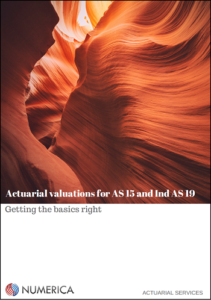
All kinds of businesses, in whatever form and size, have expressed a desire to understand the regulatory framework under which actuarial valuations are performed. This is especially true for the most common benefit in India – the gratuity scheme. This guide explains when actuarial valuation is mandatory for gratuity under different regulatory frameworks.
- Payment of Gratuity Act applies to all establishments with 10+ employees
- SSC 2020 now in force — fixed-term employees qualify for gratuity after 1 year
- Corporate entities: SMC vs Non-SMC determines AS 15 exemptions
- Non-corporate entities: Large vs MSME classification (ICAI August 2024)
- Ind AS 19 mandatory for listed companies and unlisted companies meeting net worth/turnover/borrowings thresholds
Before diving into the topic, let us first understand what types of enterprises are required to offer gratuity benefits to their employees. This can be studied under two heads:
- Applicability of Payment of Gratuity Act, 1972
- Applicability of relevant accounting standards
1. Payment of Gratuity Act, 1972
The Payment of Gratuity Act, 1972 provides the statutory framework for gratuity in India:
- Gives a statutory right of gratuity to all the employees, who have
- rendered 5 years’ continuous service and
- whose services stand terminated after coming into force of the Act on account of
- superannuation, or
- retirement, or
- resignation, or
- death, or
- disablement.
- Provides for a scheme for the payment of gratuity to employees working in establishments
- in which 10 or more employees were employed, on any day of the preceding year.
- Applies to every form of business, including:
- proprietorship,
- partnership or
- a limited company.
- Once the Act becomes applicable to an organization i.e. once an establishment hires more than 10 employees, the Act would continue to apply to the same even after the number of employees gets reduced below the minimum requirement.
The Code on Social Security, 2020 came into force on November 21, 2025. Key changes affecting gratuity:
- Fixed-term employees now qualify for gratuity after 1 year of service (previously 5 years)
- 50% wage composition rule: Basic wages must be at least 50% of total remuneration for gratuity calculation
- State-level implementation rules are still being notified
For a detailed analysis of the financial impact, see our post: New Gratuity Rules India 2025.
2. Applicability of Actuarial Valuation
Once it has been ascertained that your organisation is required to run a statutory benefit scheme, you will then need to understand whether you require an actuarial valuation.
According to Chapter IX of Companies’ Act, 2013, every company must prepare books of accounts in accordance with the relevant applicable Accounting Standards as issued by ICAI. One of these accounting standards, AS 15, requires an actuarial valuation to be done for certain types of employee benefits schemes, including gratuity benefit.
2.1 Corporate Entities
Corporate Entities are classified as:
- SMCs (Small and Medium Sized Companies) – Companies with:
- Turnover not exceeding Rs.250 crore, AND
- Borrowings not exceeding Rs.50 crore
- Non-SMCs – Companies exceeding either of the above thresholds
The above classification is done according to Companies (Accounting Standards) Rules, 2021. There are few exemptions and relaxations for SMCs in complying with AS-15. To know if you are a SMC, read here.
2.2 Non-Corporate Entities
Appendix -II: Applicability of Accounting Standards to Various Entities discusses the applicability of accounting standards to non-corporate entities like LLP, Partnerships, Proprietorships, etc.
Non-corporate entities are classified by ICAI (as per August 2024 guidelines) as:
- Large Entities – Entities with:
- Turnover of Rs.250 crore or more, OR
- Borrowings of Rs.50 crore or more
Full AS 15 compliance required.
- MSMEs – Entities with:
- Turnover less than Rs.250 crore, AND
- Borrowings less than Rs.50 crore
Eligible for partial exemptions and relaxations in complying with AS-15.
To know if you fall under the MSME category and can avail exemptions, read here.
In Summary:
| Entity Type | Criteria | AS 15 Applicability |
|---|---|---|
| Corporate Entities | ||
| Non-SMC | Turnover >Rs.250Cr or Borrowings >Rs.50Cr | Full compliance |
| SMC | Turnover ≤Rs.250Cr and Borrowings ≤Rs.50Cr | Partial exemptions |
| Non-Corporate Entities | ||
| Large Entities | Turnover ≥Rs.250Cr or Borrowings ≥Rs.50Cr | Full compliance |
| MSMEs | Turnover <Rs.250Cr and Borrowings <Rs.50Cr | Partial exemptions |
Contact Us to learn more on how to make best use of these exemptions and relaxations in complying the accounting standard.
2.3 Ind AS 19
- Mandatory:
For the accounting period beginning on or after 1 April 2017, Ind AS 19 is applicable for the following companies:- All listed companies,
- Unlisted companies with net worth of Rs.250 crore or more, OR
- Unlisted companies with turnover of Rs.500 crore or more, OR
- Unlisted companies with total borrowings of Rs.200 crore or more
- Holding, subsidiary, joint venture or associate companies of the listed and unlisted companies covered above.
- Voluntary:
- Other companies may voluntarily adopt Ind AS for financial statements for accounting periods beginning on or after 1 April 2015
- Please note:
- Once a company starts following the Ind AS 19 mandatorily / voluntarily, it will be required to follow the Ind AS 19 for all the subsequent financial statements even if any of the criteria specified do not subsequently apply to it (the option is irrevocable)
- Once a company starts following Ind AS 19, it will not be required to prepare another set of reports under AS 15
- Download our guide for transition to Ind AS 19 by clicking here
For detailed comparison of AS 15 and Ind AS 19, see our post: 3 Ways in Which Ind AS 19 Is Different from AS 15.
3. Why Actuarial Valuation is Required
Actuarial valuations are required by AS 15 and Ind AS 19:
- to recognise liability when an employee has provided service in exchange for employee benefits to be paid in future and
- to recognise an expense when the enterprise consumes the economic benefit arising from service provided by an employee in an exchange for employee benefits.
4. Valuation Frequency
4.1 Financial reporting at year end
- Actuarial valuations are required at the end of every accounting period for the purpose of preparation of financial statements.
- This is required by all enterprises, if AS 15 or Ind AS 19 is applicable, whether fully or partially.
4.2 Interim financial reporting
- Applicable for enterprises which are required to present interim financial results according to AS 25: Interim Financial Reporting
- Provisions in respect of gratuity (and other defined benefit schemes) for an interim period are calculated on a year-to-date basis
- Uses the actuarially determined rates at the end of the prior financial year, adjusted for significant market fluctuations since that time and for significant curtailments, settlements, or other significant one-time events.
- It implies that actuarial valuation is not mandatory for interim financial reporting.
- However, Ind AS 19 does require an entity to determine the net defined benefit liability or asset with sufficient regularity so that the amounts recognised in the financial statements do not differ materially from the amounts that would be determined at the end of the reporting period.
- In other words, unless the extent of any actuarial gains and losses since the last valuation is expected to be immaterial, a valuation should be performed.
- In a volatile economic environment, it may be necessary for an entity to obtain a valuation at each interim balance sheet date.
5. Related Resources
For more information on gratuity valuation and compliance:
- New Gratuity Rules India 2025: Complete Guide to Labour Code Changes
- 3 Ways in Which Ind AS 19 Is Different from AS 15
- Actuarial Valuation Services in India: Complete Guide
6. Conclusion
- Payment of Gratuity Act applies to your company if you have more than 10 employees
- SSC 2020 is now in force — fixed-term employees qualify for gratuity after 1 year
- If Ind AS 19 applies to your company, actuarial valuation is required for both interim and final financial reporting.
- If AS 15 applies to your entity, assess if you are eligible for any exemption or relaxation being a SMC (corporate) or MSME (non-corporate) and avail the same.
Refer to our actuarial valuation resource page for more information on other topics related to actuarial valuation of employee benefits.
Determining which accounting standard applies to your organization — and what exemptions you may qualify for — requires careful analysis of your entity structure and financials. Our team can help you navigate compliance requirements and conduct actuarial valuations aligned with AS 15 or Ind AS 19.
Learn about basics of actuarial valuation of gratuity liability by downloading the guide below:


June 28, 2018 at 10:32 pm, Applicability of actuarial valuation on leave schemes • Numerica said:
[…] By this point, you must have noticed that this is slightly different from the applicability of actuarial valuation on a gratuity plan. The case of gratuity is very straightforward – if you have more than 10 employees, then the Payment of Gratuity Act becomes applicable and you would, most likely require an actuarial valuation. This is further explained here. […]
August 22, 2024 at 1:10 pm, Lakshmi Katoch said:
Please call to discuss
November 25, 2025 at 12:42 am, Gratuity Rules India 2025: Key Changes Explained • Numerica said:
[…] Learn more about actuarial valuation of gratuity in India. […]